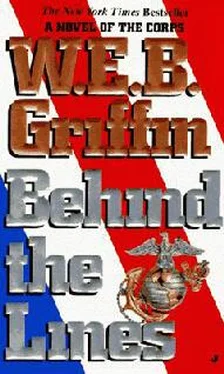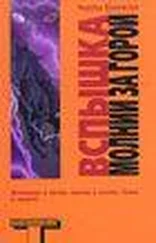W.E.B. Griffin - The Corps VII - Behind the Lines
Здесь есть возможность читать онлайн «W.E.B. Griffin - The Corps VII - Behind the Lines» весь текст электронной книги совершенно бесплатно (целиком полную версию без сокращений). В некоторых случаях можно слушать аудио, скачать через торрент в формате fb2 и присутствует краткое содержание. Жанр: prose_military, на английском языке. Описание произведения, (предисловие) а так же отзывы посетителей доступны на портале библиотеки ЛибКат.
- Название:The Corps VII - Behind the Lines
- Автор:
- Жанр:
- Год:неизвестен
- ISBN:нет данных
- Рейтинг книги:3 / 5. Голосов: 1
-
Избранное:Добавить в избранное
- Отзывы:
-
Ваша оценка:
- 60
- 1
- 2
- 3
- 4
- 5
The Corps VII - Behind the Lines: краткое содержание, описание и аннотация
Предлагаем к чтению аннотацию, описание, краткое содержание или предисловие (зависит от того, что написал сам автор книги «The Corps VII - Behind the Lines»). Если вы не нашли необходимую информацию о книге — напишите в комментариях, мы постараемся отыскать её.
The Corps VII - Behind the Lines — читать онлайн бесплатно полную книгу (весь текст) целиком
Ниже представлен текст книги, разбитый по страницам. Система сохранения места последней прочитанной страницы, позволяет с удобством читать онлайн бесплатно книгу «The Corps VII - Behind the Lines», без необходимости каждый раз заново искать на чём Вы остановились. Поставьте закладку, и сможете в любой момент перейти на страницу, на которой закончили чтение.
Интервал:
Закладка:
"I thought you had better be there, in case something needs clarification."
"Yes, Sir."
"And it's possible that Haughton may want to talk about the Mongolian Operation. If that's the case, I thought it would be better if you were up to date on it, changes, et cetera, since you left."
"Yes, Sir."
"As soon as we're finished with Haughton, you're finished. Take the week I mentioned last night."
"Aye, aye, Sir."
"Do you think you could rustle up some coffee, Ed?"
The door chimes sounded.
Banning opened the door to admit the waiter with the coffee Carolyn had ordered from room service.
"Your wish, Sir," Banning said, chuckling, "is my command. I trust the Colonel will pardon the delay?"
[SIX]
Temporary Building T-2032
The Mall, Washington, D.C.
1045 Hours 17 October 1942
Captain David W. Haughton, USNA '22, a tall, slim, intelligent-looking Naval officer, had called for a Navy car to take him to The Mall, where a large collec-tion of "temporary" frame buildings built to house the swollen Washington bureaucracy during World War I were now occupied by the swollen-and still swelling-bureaucracy considered necessary to wage World War II.
A 1941 Packard Clipper, painted Navy gray, with enlisted chauffeur, was immediately provided. This was not in deference to Captain Haughton's rank-it was said there were enough captains and admirals in Washington to fully man all the enlisted billets provided for on a battleship-but to the rank of his boss.
Captain Haughton, who would have much preferred to be at sea as a lieu-tenant commander in command of a destroyer-as he had once been-was Ad-ministrative Assistant to the Secretary of the Navy, the Honorable Frank Knox.
There were, of course, official automobiles assigned to the Office of the Secretary of the Navy, including two limousines. One of these was at the mo-ment in use by Secretary Knox, and the second was in the Cadillac dealership having a bad clutch repaired. There were also two 1942 Plymouth sedans painted Navy gray. Chief Petty Officer Stanley Hansen, USN, Haughton's chief assistant, regarded one of these as his personal vehicle, and Haughton was reluctant to challenge the Chief's perquisites. And he was reluctant to use the second Plymouth because he regarded it as a necessary spare. The Secre-tary's limousine-or Chief Hansen's Plymouth-might collapse somewhere.
And finally, he had requested a car from the motor pool for an admittedly petty, selfish reason. It had rained hard all day, and he thought it was unlikely to stop. He correctly suspected that the motor pool would dispatch a car much like the Packard that was in fact sent, a large car, reserved for admirals, and consequently equipped, fore and aft, with a holder for the starred plates admi-rals were entitled to affix to their automobiles. When an admiral was not actu-ally in his car, the holder was covered.
The Shore Patrol, which patrolled the area of The Mall where Haughton was headed, would, he thought, be somewhat reluctant to challenge an illegally parked Packard with a flag officer's plate holder on it-even if the admiral's stars were covered. He could thus tell the driver to park right in front of Tem-porary Building T-2032, where he had business to transact with the Marine Corps Office of Management Analysis. This would spare him a long walk in the rain to and from the parking lot where lowly captains were supposed to park.
The Packard pulled to the curb before one of the many identical two-story frame buildings, and the driver started to get out to open Haughton's door.
"Stay in the car, son," Haughton ordered, opened the door himself, and, a heavy black Navy-issue briefcase in his left hand, ran through the rain down a short concrete path to the building and stepped inside into a vestibule.
There was a sign reading "ABSOLUTELY NO ADMITTANCE" on the door to the stairway of the two-floor frame building.
Haughton pushed it open and stepped inside. Inside, there was a wall of pierced-steel planking (interlocking sections of steel, perforated to permit the passage of water, designed for the hasty construction of temporary aircraft run-ways; it was quickly adopted for a host of other purposes). A door of the same material (closed) and a window (open) were cut into the wall. Through the window, Haughton could see a Marine sergeant armed with a Colt Model 1911A1.45 ACP pistol, in a shoulder holster, sitting at a desk in his khaki shirt. His blouse hung from a hanger hooked into the pierced steel netting wall. Hanging beside his blouse was a Winchester Model 1897 12-gauge trench gun.
The pierced steel wall and the armed guard were necessary because the Marine Corps Office of Management Analysis had nothing whatever to do with either management or analysis. What the Office of Management Analysis did was clandestine intelligence, and special, clandestine, operations.
The sergeant saw him, recognized him, and stood up.
"Good morning, Sir," he said. "I know the Colonel expects you."
Haughton held out to him a photo identification card.
"Yes, Sir, thank you, Sir," the sergeant said, and pushed a clipboard through the window opening in the pierced-steel planking.
Haughton wrote his name, the time, and "Colonel Rickabee" in the "To See" blank on the form on the clipboard and pushed it back. Colonel F. L. Rickabee was Deputy Chief of the Office of Management Analysis.
"Thank you, Sir," the sergeant said, and then pressed a hidden button. When he heard the buzzing of a solenoid, Haughton pushed open the door in the metal wall.
He walked through a second interior door, which gave access to a stair-way. He waited for a second buzz of a solenoid, then pushed the door open and started to climb the stairs. Behind him, he heard the sergeant, apparently on a telephone, say, "Colonel, Captain Haughton is on deck."
Haughton went up the wooden stairs two at a time. Beyond a door at the top of the stairs was another pierced-steel wall. Beside it was a doorbell button. As Haughton reached to push the button, the door opened.
"Good morning, Sir," Major Ed Banning said.
When he saw Banning, Haughton was always uncomfortably reminded of his own noncombatant role in the war. On Banning's tunic were half a dozen ribbons, including one whose miniature oak-leaf cluster represented the second award of the Purple Heart, for wounds received in combat. The ribbon repre-senting service in the Pacific Theater of Operations was further adorned with a small black star, indicating that the wearer had not only been in the Pacific but had participated in a battle.
In Banning's case, this was the battle of the Philippines. Haughton had learned-not from Banning, but from Lieutenant Kenneth R. McCoy, who had been there-that Banning took shrapnel from Japanese artillery during the ini-tial Japanese landings. Left behind when American forces retreated, and hiding out behind the enemy lines, he came under American artillery fire, whose con-cussion blinded him.
He was ultimately led through the enemy lines to a hospital, and finally to the hospital on Fortress Corregidor. From there he was evacuated, with other blinded men, by submarine. His sight inexplicably returned while he was on the sub.
"How are you, Banning?"
"Very well, thank you, Sir. I guess we heard from The Boss?"
Haughton held up the briefcase, which was attached to his wrist by a steel cable and half a handcuff. Then he walked through the pierced-steel planking door, and down a narrow corridor to the end, which held the offices of the Chief, USMC Office of Management Analysis, and his deputy.
The door was opened by Colonel Rickabee, who had changed into a uni-form after his breakfast meeting with Banning at the Foster Lafayette. But even in uniform, with the silver eagles of a colonel pinned to his collar points, and even wearing a 1911A1.45 automatic in a shoulder holster, Colonel F. L. Rickabee, USMC, did not look much like a professional warrior.
Читать дальшеИнтервал:
Закладка:
Похожие книги на «The Corps VII - Behind the Lines»
Представляем Вашему вниманию похожие книги на «The Corps VII - Behind the Lines» списком для выбора. Мы отобрали схожую по названию и смыслу литературу в надежде предоставить читателям больше вариантов отыскать новые, интересные, ещё непрочитанные произведения.
Обсуждение, отзывы о книге «The Corps VII - Behind the Lines» и просто собственные мнения читателей. Оставьте ваши комментарии, напишите, что Вы думаете о произведении, его смысле или главных героях. Укажите что конкретно понравилось, а что нет, и почему Вы так считаете.










